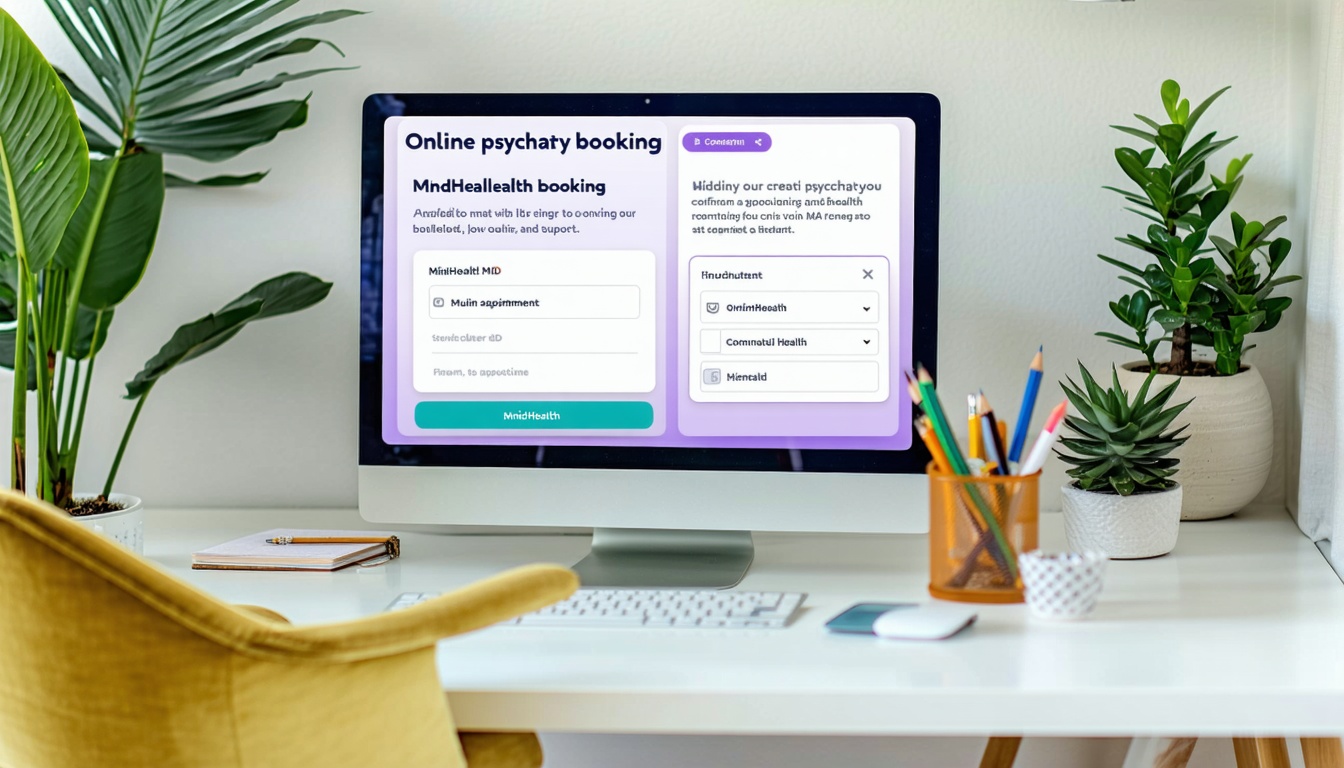Introduction
If you or a loved one is dealing with both a mental health condition and a substance use disorder, you’re not alone. Each challenge is tough in its own right, but coping with both at the same time can feel overwhelming. This is why a dual diagnosis psychiatric program can make a real difference in your recovery journey. It focuses on treating co-occurring disorders—mental health conditions and substance use disorders simultaneously—rather than addressing them separately. Researchers have found that about half of individuals with a substance use disorder will also experience a mental health disorder, and vice versa [1].
At MindHealth MD, we understand that you’re looking for targeted, effective care that also feels personal. Our telehealth psychiatry services, Medication Assisted Treatment (MAT) options, and TMS (transcranial magnetic stimulation) treatments can be combined to form a thorough approach for dual diagnosis. By integrating mental health support and addiction recovery strategies, you can find a clearer path toward feeling better—both physically and emotionally.
Below, you’ll see why addressing both conditions at once is crucial, how dual diagnosis treatment works, and why MindHealth MD stands out as a leading solution for telehealth psychiatry, MAT, and TMS services.
Understand dual diagnosis
Dual diagnosis, often called co-occurring disorders, refers to situations where you’re dealing with both a mental health issue (like depression, anxiety, or bipolar disorder) and a substance use disorder (involving alcohol or drugs). According to the Substance Abuse and Mental Health Services Administration, roughly 21.5 million adults in the United States live with a co-occurring disorder [2].
What defines a dual diagnosis
A mental health condition and a substance use disorder can feed off each other. For instance, anxiety may trigger alcohol misuse, or stimulant use could intensify your bipolar symptoms. In a dual diagnosis scenario, each condition can make the other worse if not addressed together. This is precisely why specialized care is so critical. Taking part in a dual diagnosis psychiatric program means you’ll get help for both issues—rather than leaving one untreated and letting it sabotage the other aspect of your recovery.
Why it’s so important
Untreated substance use can mask or worsen mental health symptoms. Untreated mental health conditions can, in turn, drive you to use substances as a coping strategy. It becomes a negative cycle that’s extremely difficult to break without the right support. Studies indicate that integrated treatment—where mental health disorders and substance use disorders are addressed side-by-side—paves the way for better outcomes [3]. By focusing on both challenges at once, you’re setting yourself up for a more stable, lasting recovery.
Recognize the signs
It can be hard to pinpoint whether you or a loved one needs a dual diagnosis psychiatric program. Sometimes the signs overlap, and it’s tricky to know which came first. Still, you’ll want to pay attention to patterns that may signal a deeper issue.
- Changes in mood or personality (anger, severe anxiety, or depressive episodes)
- Escalating substance use to self-medicate or cope
- Struggling to fulfill daily obligations (work, school, or family life)
- Withdrawing from friends or suddenly changing social circles
- Risky behaviors like driving under the influence or mixing medications incorrectly
Perhaps you’ve been in a situation where you notice you’re feeling worse each time you drink or misuse drugs, or your mental wellbeing plummets if you can’t access certain substances. These behaviors are often red flags that you might benefit from a specialized program.
How it affects daily life
When both mental health and substance use are in play, everyday tasks can seem enormous. You may feel ill-equipped to handle work deadlines, manage relationships, or even keep up with self-care routines like sleep or exercise. Over time, your body and mind become depleted. According to research, those with co-occurring conditions face higher risks of homelessness, incarceration, and chronic health issues if they don’t receive integrated care [3]. Recognizing these signs early can be key to turning things around.
Explore integrated treatment
You might wonder why so much emphasis is placed on integrated care. After all, can’t you just treat substance use or mental health disorders one at a time? The answer is that overlapping symptoms can easily intensify each other, making a sequential approach less effective.
The power of simultaneous treatment
By dealing with both issues under the same umbrella of care, clinicians can create a cohesive strategy that addresses the interplay between substance abuse and mental health. If you’re depressed, for example, and turn to alcohol, a plan that treats the depression but ignores the alcohol issue might leave you stuck. Conversely, focusing on detox from alcohol without addressing deeper emotional struggles might only solve part of the puzzle.
At MindHealth MD, you’ll find an emphasis on revitalizing your life holistically. Your provider can coordinate medication, therapy, and supportive services so they all feed into each other’s success. If you need specialized substance use care, you may benefit from our substance use psychiatry service or co occurring disorders treatment.
Evidence-based therapies
Research-based therapies form the backbone of any strong dual diagnosis psychiatric program. Cognitive-behavioral therapy (CBT), dialectical behavior therapy (DBT), and motivational interviewing (MI) are proven to help clients recognize negative thought patterns and find healthier ways to respond. Studies confirm that integrating these behavioral approaches with medication, if recommended, boosts the chances of long-term recovery [1].
Discover key program elements
No two people experience co-occurring disorders the exact same way, so an effective dual diagnosis psychiatric program should adapt to your needs. When you’re ready to actively pursue help, here are a few components you’ll likely encounter.
Behavioral therapies
Therapies like CBT and DBT can be cornerstones of dual diagnosis treatment. They help you identify triggers for substance use, challenge cognitive distortions, and develop coping strategies for mental health symptoms. The process involves practicing new skills in real-life scenarios, so it doesn’t feel purely theoretical. You may also attend group sessions where you can learn from peers in similar situations.
Medication management
Medications can be life-changing when used properly. For example, antidepressants in combination with talk therapy can help stabilize your mood, while MAT might address alcohol or opioid addiction. Some drugs, like bupropion (marketed as Wellbutrin or Zyban), can tackle depression and nicotine dependence simultaneously [1]. If you need specialized support for medication, you might explore our psychiatric medication management or medication assisted treatment services.
Support groups
Recovery doesn’t happen in isolation. Support groups offer a chance to connect with others who understand the challenges you face. You can share your experiences, swap coping tips, and celebrate milestones in a judgment-free environment. Whether it’s a local group or an online gathering, these spaces help you stay motivated when everyday life feels tough.
Coordinated care
In some cases, you might require inpatient detoxification if your substance use is severe. Other times, an outpatient program—where you continue to live at home but attend regular therapy and check-ups—works best. Individual circumstances vary, so understanding what balance of medical oversight, therapy, and community support will best serve you is critical.
Many programs also include physical health screenings, such as HIV or hepatitis testing, especially where injection drug use is a factor [2]. This holistic approach helps you stay on top of all aspects of your health as you work toward wellness.
Choose MindHealth MD
With an unrelenting focus on evidence-based care and a commitment to meeting you where you are in your journey, MindHealth MD aims to make mental health and addiction recovery as accessible as possible. Here’s why you might consider joining our dual diagnosis psychiatric program and how we leverage telehealth psychiatry, Medication Assisted Treatment, and TMS services to support you.
Telehealth psychiatry for accessible care
If you’ve ever been daunted by the idea of juggling work schedules, family responsibilities, or transportation to in-person appointments, telehealth psychiatry might be your answer. At MindHealth MD, you have the option to book psychiatric appointment straight from the comfort of your home, or set up a telepsychiatry appointment that fits your schedule.
Telehealth offers:
- Greater flexibility—no time lost commuting
- A comfortable environment for speaking openly
- Access to specialists even if you live in a rural area
- Consistent care, thanks to easy follow-ups
We also provide virtual psychiatry session options that maintain the same quality as in-person visits. You’ll talk to licensed professionals who specialize in treating co-occurring disorders, ensuring you receive focused, up-to-date care.
Medication Assisted Treatment (MAT) for comprehensive help
When you’re battling a substance use disorder, medication can be a game-changer. MAT combines FDA-approved medications with counseling and other therapies. This approach helps you reduce cravings, manage withdrawal symptoms, and maintain your focus on healing.
- Opioid addiction: MAT for opioid addiction can stabilize you so you can engage in therapy and lifestyle changes
- Alcohol dependency: MAT for alcohol dependency offers support for curbing cravings and reinforcing healthier habits
- Overlapping mental health issues: By pairing MAT with treatment for anxiety, depression, or PTSD, you can enhance your overall recovery
MindHealth MD follows guidelines that ensure the safe combination of medications for mental health conditions and addiction treatment. For instance, we pay special attention to interactions between benzodiazepines and SUD medications because combining them requires close monitoring [2].
TMS therapy for depression and beyond
If you’re struggling with treatment-resistant depression alongside a substance use issue, TMS (transcranial magnetic stimulation) could open a new door to relief. At MindHealth MD, we provide TMS to help stimulate areas of the brain associated with mood regulation. Many individuals see improvements in depressive symptoms, offering a chance to reduce reliance on older treatments that may not have worked as hoped.
For more information, you’re welcome to schedule tms treatment, explore tms therapy for depression, or learn more about transcranial magnetic stimulation providers who can tailor TMS to your specific situation.
EEG brain mapping and diagnostics
Mental health conditions can be incredibly complex, and sometimes you need more data. MindHealth MD performs eeg brain mapping test and other eeg diagnostic for mental health tools to see how your brain is functioning. These diagnostics inform your care team about potential areas of dysregulation, allowing them to create a more individualized treatment approach.
Insurance options and flexible scheduling
We know finances can be a concern, so the idea of insurance accepted psychiatry or in network psychiatry care can bring some relief. We do our best to make sure you can access the care you need without undue hassle. For those who prefer not to go through insurance, self pay psychiatry session is an option.
If you find yourself in a pinch, you can opt for an immediate psychiatry appointment or a same day psychiatric evaluation, letting you address urgent issues without delay. Our aim is to meet you where you’re at—whether you’re amid a crisis or simply need a fresh start for your dual diagnosis treatment plan.
Focus on lasting recovery
Choosing integrated care is a major step, but true healing takes time. You might work with doctors, therapists, and support groups for months—even years—to fully address the underlying factors fueling your mental health problems and substance use.
Emphasizing long-term support
Recovery isn’t just about no longer using substances or feeling less anxious for a couple of weeks. It’s about building a balanced lifestyle that stands the test of time. That could mean regular check-ins with your psychiatrist, sticking to therapy sessions, or continuing specific medications that help regulate your mood or cravings.
In some situations, you may also explore advanced approaches like eeg for treatment planning to better understand how your brain is responding to medication or therapy. MindHealth MD prioritizes ongoing monitoring, so whenever you need an adjustment—maybe a medication tweak or a renewed therapy schedule—we’re there to help.
Reinforcing healthy habits
Daily activities, including consistent sleep schedules, balanced nutrition, and gentle exercise, often play a huge role in your wellbeing. Learning to manage stress through mindfulness practices, journaling, or creative outlets is equally valuable. Many individuals who complete a dual diagnosis psychiatric program discover new passions or reconnect with old ones, from painting to meditation, to stay centered.
Continued engagement in a community—whether that’s a local peer group or a telehealth check-in—keeps you accountable. If you notice old triggers cropping up, you can immediately reach out for a mental health urgent appointment. Over time, you’ll gain more confidence in your ability to handle challenges without relapsing into harmful behaviors.
Get answers to FAQs
Below are some of the most commonly asked questions about dual diagnosis and how a specialized program can help you or a loved one.
-
What exactly is a dual diagnosis psychiatric program?
A dual diagnosis psychiatric program is designed to treat both mental health disorders and substance use disorders at the same time. Since these issues often overlap or fuel each other, you can find more effective relief by integrating treatments. This might involve therapy, medication, support groups, and continuous psychiatric evaluations. MindHealth MD offers such a program within its telehealth and in-person services, ensuring you get personalized support every step of the way. -
How do I know if I need dual diagnosis treatment instead of separate care?
If you’ve noticed that your substance use worsens or starts whenever your mental health symptoms flare up (or vice versa), you might benefit from an integrated approach. Signs could include increased drug or alcohol use to cope with stress, persistent depression or anxiety, or repeated challenges in daily life. If you’re unsure, consider scheduling a same day psychiatric evaluation to discuss your symptoms with a professional and develop a tailored plan. -
Is telehealth psychiatry effective for dual diagnosis?
Absolutely. Telehealth psychiatry offers a convenient way to connect with mental health and addiction specialists from your home. It’s especially valuable if transportation or schedule conflicts are barriers for you. At MindHealth MD, a virtual psychiatry session mirrors the quality of an in-person meeting. You’ll be able to discuss medications, therapy strategies, and progress check-ins easily, all while maintaining your privacy and comfort. -
What if I need both medication and therapy for substance use and mental health?
That’s actually the core of dual diagnosis care. Many individuals find that combining therapy—such as cognitive-behavioral therapy or motivational interviewing—with medication yields the best outcomes. Medications might focus on stabilizing your mood, reducing cravings, or making it safer to quit a substance. MindHealth MD provides medication assisted treatment, along with evidence-based therapies, so you can receive everything in one place. -
How long does dual diagnosis treatment typically last?
The length varies from person to person. Some may see significant improvement in a few months, while others need a year or more of consistent care and follow-ups. Complex conditions—particularly those involving severe substance dependence or multiple mental health diagnoses—can take time to stabilize. Your care plan might include continued therapy, medication adjustments, or appointments for psychiatric medication management, ensuring you maintain progress well into the future.
Conclusion
Choosing a dual diagnosis psychiatric program is an investment in your overall wellbeing, ensuring both your mental health and substance use are tackled together. You deserve comprehensive, professional care that addresses all aspects of your life—from the physical to the emotional. With MindHealth MD, you’ll find a compassionate team ready to guide you through telehealth appointments, TMS treatments, and tailored medication strategies.
Recovery can feel like a winding journey, but you don’t have to walk it alone. If you’re ready to take the next step, consider reaching out for a telepsychiatry appointment or calling for more personalized recommendations. By facing both conditions at once, you can build a more stable foundation for a healthier future—one that leaves you feeling more hopeful and in charge of your life.








